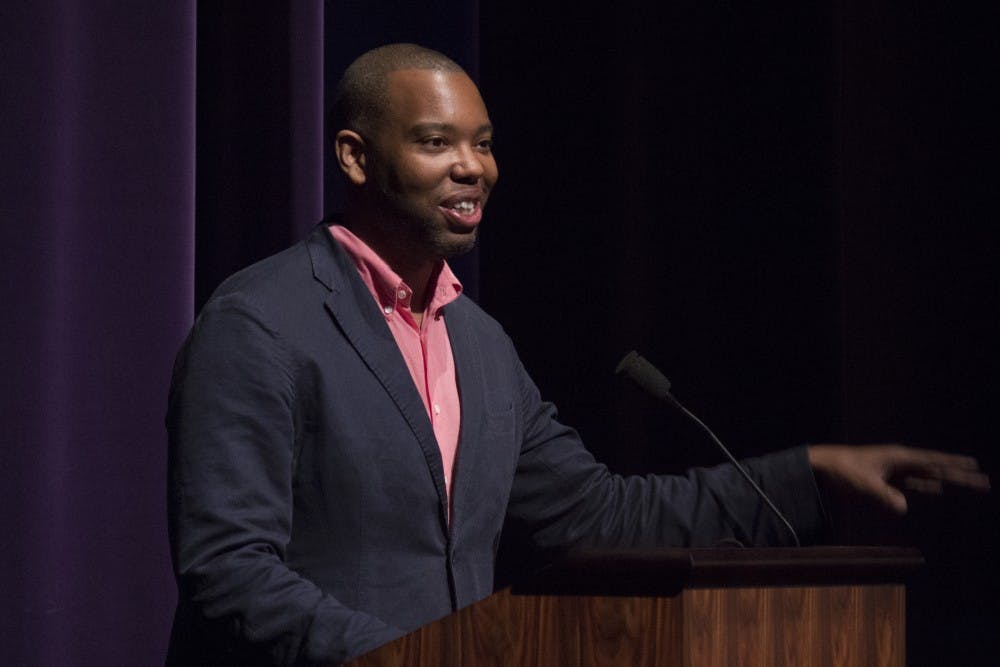“Don’t quit, don’t ever quit,” he said. “That constant confrontation with failure is what writing is.”
Coates can be identified in many ways: a national correspondent for the Atlantic, author of the No. 1 New York Times bestseller “Between the World and Me” and a cultural critic. Coates has received the National Magazine Award, the Hillman Prize for opinion and analysis journalism and the George Polk Award for his Atlantic article “The Case for Reparations.”
Coates spoke Friday afternoon at the Musical Arts Center. In addition to discussing his most recent book, he addressed the current racial issues plaguing America: white supremacy and the mass incarceration of African-Americans in the country.
Coates began by telling the audience what inspired him to write “Between the World and Me.” Coates reminisced about reading African-American writer James Baldwin’s book, “The Fire Next Time.”
“I just wondered for so long why people didn’t write with that sort of passion, with that sort of beauty, with that sort of vigor, with that sort of fire that Baldwin did and apply it to the big issues of our time,” Coates said. “And I wanted to write something that did that.”
Frederick McElroy, associate professor in the African-American and African Diaspora Studies department, said Coates’ passion is palpable.
“These issues are personal for him,” McElroy said. “That to me is one of the secrets in his power of writing.”
In the midst of a successful career, Coates said he still harbors the fear of writing, nevertheless.
“It is you and the blank page,” he said. “A kind of terror seizes over you when you see that page. That terror never goes away. It is the job.”
Before transitioning into a deeper discussion about his book, Coates took one last opportunity to motivate young writers.
“So for young writers who are here in the audience,” he said. “I just want you to reconcile yourself to that craft. Keep going. Don’t give up. Don’t go to business school because this writing thing is really hard. Don’t go do some other thing because you are failing.”
Coates added he has endured growing pains and continues to fail today.
“When I was your age I was failing,” he said. “When I was older than you, I was failing. When I was writing ‘In Between the World and Me,’ I was failing. That’s the process.”
Coates opened up the narration of his book by reflecting on the life and death of his friend Prince Jones. Jones was supposedly racially profiled and followed by two undercover cops before being shot and killed outside of his fiancée’s home. This incident sparked a fear in Coates.
The difference between being black in America and being white in America is that there is no level someone of color can rise to in which they can be immune to that kind of fear, Coates said.
“A particular fear that your child will be mistaken for a criminal and will be killed for it,” he said. “When I wrote this book, what I wanted more than anything was to get across to you what the weight of racism in this country means, what the weight of white supremacy in this country means. I wanted you to feel it.”
After reading an excerpt from his book, Coates discussed the biggest fear that threatened his childhood.
“Growing up in west Baltimore my greatest fear, my most immediate fear, was the people I lived around,” he said.
However, Coates attributed that fear, black-on-black crime and the recent epidemic of police violence, to public policy.
Coates continued to highlight what he saw as the importance of confronting America’s racial history.
“Between the World and Me,” is a book that really tries to argue that you cannot escape history, Coates said.
“Patriotism can’t just be scarfing down hot dogs and hamburgers on the Fourth of July,” Coates said. “That is an opportunistic way of looking at history. We as Americans are paying for that ignorance.”
Brailyn Davis, a junior, said she appreciated Coates willingness to publicly tackle the issues of racial equality and social justice.
“I think that it’s important that if you want to see change that you need to educate yourself, and this is a great opportunity to stay educated,” she said.
When you lie to yourself about your history, it’s easy to lie to yourself about so many other things, Coates said.
Coates went on to address the history of white supremacy in America.
It is not a matter of one group of people merely being mean to another group of people, he said.
“Enslavement in this country was not like summer camp where they didn’t pay you,” he said. “It was torture. It was to extract revenue. You try to imagine America subtracting that wealth and you just don’t have an America.”
After delivering his speech, Coates received a standing ovation.






